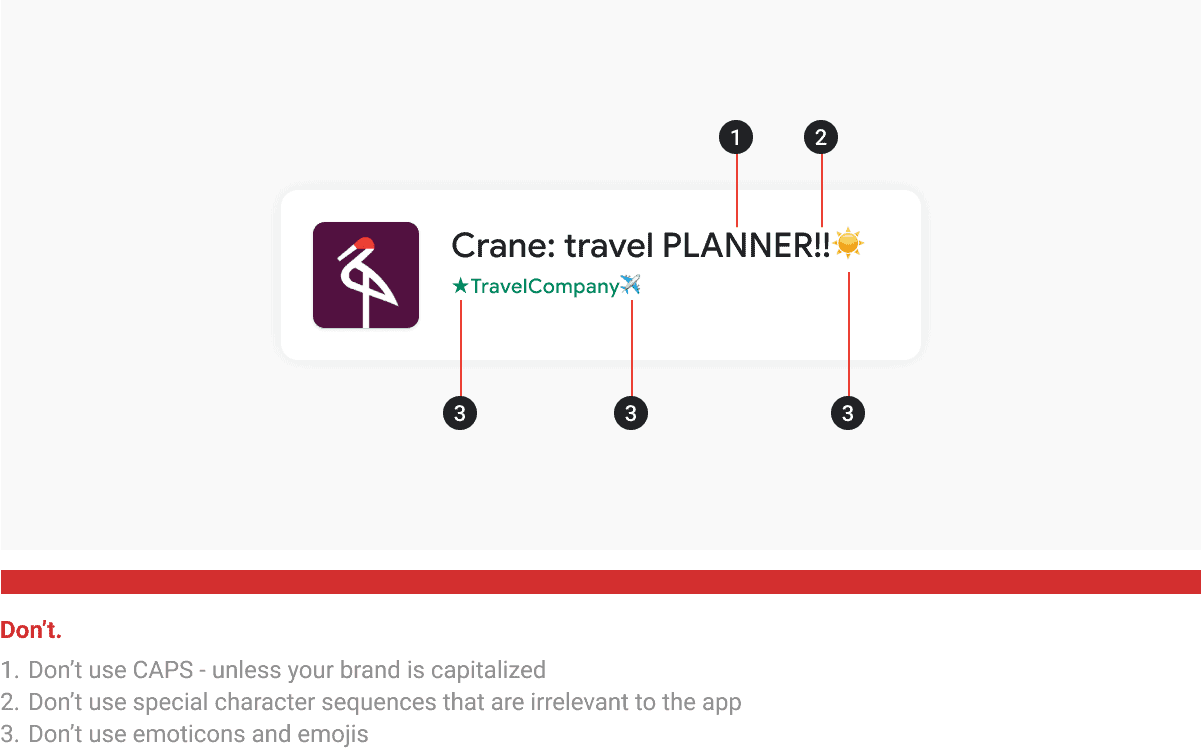Google is doing something against misleading Play Store titles, names and icons

If you have been to Google's Play Store recently, the Android application repository for lots of devices, then you may have encountered a fair share of applications and games that tried to game the system.

Maybe, you have encountered one of the following while on the Store:
- Titles that use text to indicate ranking, e.g. #1 or Top used in the title.
- Titles that promote deals, e.g. "free" or "no ads".
- Titles that incentivize downloads and installs.
- Titles that use CAPS.
- Titles that use special character sequences not relevant to the app.
- Titles that use emoticons or emojis.
- Very long titles that are stuffed with keywords.
- Misleading or suggestive icons.
Google announced plans on its Android Developers Blog to do something about the listed title and screenshot / icon uses on its Play Store.
In short, Google decided to limit app titles to 30 characters, to prohibit keywords that "imply store performance, promotion in the icon, title and developer name, and to eliminate misleading graphical elements in the app icon, screenshots, and videos.
A number of examples have been published on the developer blog to better showcase issues that Google is trying to eliminate on its Play Store. Hand in hand with the new rules comes an update guideline for Store listing preview assets.
Google plans to start enforcing the new guidelines in the second half of 2021.
Developers whose applications and games don't meet the new guidelines won't have their titles removed from Google Play. Instead, their applications "may be ineligible for promotion and recommendation on major Google Play surfaces like Apps and Games home".
The sanctioning of apps that don't meet the new guidelines may impact the performance of apps and games on the store significantly. Google did not reveal if paid promotions, e.g. through Play Store advertisement, is impacted by the decision as well.
For users, it is making the Store cleaner by removing suggestive titles, developer names and icons from the Store and by reducing the visibility of apps and games that continue to use these.
Closing Words
Application titles, developer names, icons, screenshots and videos will be cleaner from the second half of 2021 on. Most publishers and developers will follow the new guidelines as not following them may have serious consequences for the application's performance on the Play Store.
Now You: Step in the right direction or not enough, what is your take on the announced guideline changes?






















Martin, I not only do not trust Google’s promisses, but I have lost respect for Alphabet group and their respective products & services. I am an old Brazilian journalist, a pioneer in using Google in my country. Unfortunately, though, from the “Be no evil” times until now, Big Tech has changed into a sociological disruptive industry – with very few exceptions.
Thanks for your open and honest comments in all you write.
Best,
Vitor
How about enforcing proper changelogs for each update? But I guess Google would be a hypocrite if it did so unless it starts posting these for its own apps first…
Would be a nice start if they would make developers actually post what their apps cost. Everything is “Free” with in-app purchases. That’s very useful. Thanks.
I’d prefer to see them clear out the useless apps that fail to do what the writers claim. Also, enforce links to FULL documentation, including the data it sucks while you use the app.
What a joke. This has been a serious problem on Google’s Play store for years. And now, what is Google doing about it? Basically, nothing. You can still violate all the “rules”, and the only consequence is that won’t promote your app. Really, that’s it? How many apps do they actually promote that aren’t their own apps? There are probably tens of thousands of scam or misleading apps in Google’s Play store, and Google clearly doesn’t really care… perhaps because they profit from it.
Exactly. Too little, too late.
Yes. They got $25 for developer account and money for ads.
it would be nice if they also target the games with misleading ads.
Example –
advertise a puzzle game where you free someone from a trap by pulling rods
actual game is a match 3….
Yea. Or games that show AoE2 game as their mobile game.